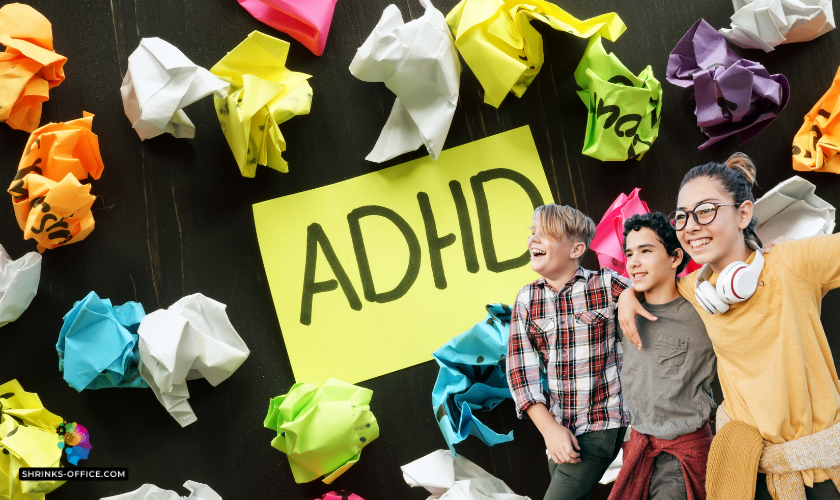In today's fast-paced world, finding moments of mindfulness can be a challenge. Embracing "The Power of Now"...

- Create a more positive and supportive environment
- Get to know their friends
- Understand their hobbies and interests
- Be present in their daily lives
- Build trust and encourage them to talk about their struggles
- Learn about your child's classes and daily extracurricular activities
- Help them identify meaningful and relevant goals aligned with their interests
- Reward them for accomplishing goals
- Focus on correcting the behavior rather than punishing the person
- Establish rules that are clear and consistent
If you're unsure if your child has ADHD, we recommend the ADHD Test.
We'll provide you with some tips on how to motivate a teenager with ADHD symptoms in this article. Also, you'll learn about possible treatments available for teens with ADHD.
Getting more involved with your younger children helps create a more positive and supportive environment for them. Start by getting to know their friends, understanding their hobbies and interests, and being present in their daily lives. Connecting with your teen in this way can help build trust and encourage them to talk about their struggles. [2]
Additionally, supporting teens can be easier if you keep the lines of communication open. Listening to what they have to say without judgment and offering encouragement can help teenagers succeed despite their condition.
Helpful tip
Discover the power of connection with your child and unlock the life-changing benefits of therapy for their emotional and mental well-being with our blog.

Knowing what your child is doing in middle school gives you, as their parent, a once-in-a-lifetime chance to bond with them before adulthood. You can learn about your child's classes and daily extracurricular activities by speaking to the teacher and coach. [3]
It'll help you gauge their progress and find solutions or resources for their difficulties.
Helpful tip
Building a strong bond with your child can be enhanced by insights from online therapist influencers, who share vital strategies for effective communication.

Having goals is a great way to motivate a teenager with hyperactivity disorder. It’s best to help them identify meaningful and relevant goals to their interests. Ensure the goals are achievable and there are incentives or external rewards in place to help your teen stay motivated.[4]
Start by discussing the type of goals they would like to achieve. For example, if your teenager loves music, they might set a goal to learn a new instrument or to compose a song. Or, if they’re interested in technology, they could aim to create an app. Once you have identified the goal, help your teen break it down into smaller, more manageable steps like a to-do list. That way, each step feels like a small accomplishment rather than an overwhelming chore.
Helpful tip
Foster a deeper connection with your child using online therapy that takes insurance - a cost-effective way to support their mental health journey.

When it comes to motivating a teenager with ADHD, rewarding them for accomplishing goals is an important step. The rewards you offer should be appropriate to the goal and tailored to your teen’s individual needs and interests.
For example, if your teenager has made strides in their academic functioning, offering them a chance to do something they enjoy – such as visiting an amusement park or taking a memorable trip – may be more motivating than offering cash or material rewards.
Also, it can be helpful to set up a reward system in which rewards increase incrementally based on the level of effort. This will encourage your teen to work hard and stay motivated to continue working towards their goals.
Finally, providing consistent praise and recognition along the way is important. Even small compliments like “You worked hard on that project” or “I'm proud of you for meeting your deadline” can go a long way toward keeping your teen motivated.
The rewards you offer should reflect your teen's accomplishments and be proportional to their efforts. Always remember, the aim is to motivate and encourage them, not to create a transactional relationship where they only work for rewards.

It's crucial to ensure the penalties for reckless actions are just and consistent if you want to motivate teens with ADHD. Punishment should be focused on correcting the behavior rather than punishing the person. Teenagers with ADHD, in particular, may struggle to regulate their impulses and may not comprehend why their actions have long-term consequences. [5]
Parents should be careful to establish rules that are clear and consistent. Teenagers with ADHD are more likely to respond positively when they know what is expected of them. In addition, they should understand the consequences of their actions. For example, if your teen misses curfew or fails to complete an assignment, there should be immediate consequences. This may include a time-out, restricted privileges, or a verbal warning.
In addition, parents should be careful not to punish their kids too harshly. Remember that teens with ADHD lack focus and control of their behavior. Remember that positive reinforcement works better for teaching than punishments for kids.

People with ADHD have access to a wealth of online resources, support groups, and hotlines.
Here are a few of them:
Lorian Phillips was once a highly stressed parent of two ADHD boys, one inattentive and dreamy, the other hyperactive and chaotic. Despite her background as a therapist, dealing with her sons' ADHD was a challenge she wasn't prepared for. Recognizing that their behaviors weren't intentional, she began to educate herself on the condition, learning that traditional discipline strategies often fell short for children with ADHD. Instead, she implemented motivational strategies like reward systems and activities that interested and engaged her sons' brains, which significantly improved their behavior and family dynamics.
Years later, Lorian now looks back at the tumultuous parenting years as a distant memory. She emphasizes that while ADHD doesn't disappear, effective parenting techniques can greatly help in managing the condition. Today, both her sons are adults who have learned to manage their ADHD effectively. Based on her personal experiences and extensive research, Lorian has developed a course to help other parents of children with ADHD, providing them with tools and strategies to better understand and manage the condition.
Motivating a teen with ADHD can be challenging. However, by getting involved in their life, learning more about what they are doing, setting achievable goals, rewarding their success, and providing consequences for irresponsible actions, any parent can help ensure their teen has the drive and confidence to succeed.
Online therapy offers personalized guidance and strategies for parents to effectively support and motivate their ADHD teens, enhancing their overall well-being.
There are many reasons why a teen with ADHD may lack motivation. First, ADHD can affect the executive functioning skills needed to turn an idea into a plan, organize, and finish tasks. This can lead to difficulty focusing and feeling overwhelmed when trying to complete activities, even those that would otherwise be enjoyable. Additionally, many teens with ADHD may become easily bored or distracted when tasks require sustained concentration, leading to an inability to complete the activity.
Another reason why most kids with ADHD lack motivation is due to negative reinforcement from their peers, teachers, or parents. Children may feel discouraged after repeated failures, leading to a lack of motivation.
People with ADHD find themselves feeling overwhelmed and unable to focus on one task for too long. However, there are plenty of activities that can help them stay engaged and have fun. From physical activities such as rock climbing or running, or creative activities like painting and writing, there are a variety of options available for people with ADHD. Additionally, hobbies such as video games, puzzles, and board games can provide an entertaining outlet for those with ADHD.
In today's fast-paced world, finding moments of mindfulness can be a challenge. Embracing "The Power of Now"...
In our fast-paced world, finding moments of tranquility can be a challenge. Meditation apps offer a convenient...
In our fast-paced world, taking time for self-reflection and mindfulness is essential for well-being. Journaling can be...
In today’s fast-paced world, managing stress has become an essential aspect of maintaining overall well-being. Two popular...
Dissociation can be a challenging experience, especially the one that happens at work. Are you experiencing dissociation?...
Bionic reading transforms the reading experience for ADHD individuals by guiding the eyes for focus and understanding. Dive into the world of bionic reading.
Explore the complexities of postpartum depression and genetics in our blog 'Is Postpartum Depression Hereditary?' for insights into maternal mental health.
